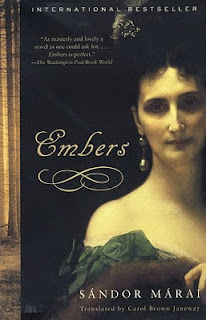Embers
Summary (from the publisher): Originally published in 1942 and now rediscovered to international acclaim, this taut and exquisitely structured novel by the Hungarian master Sandor Marai conjures the melancholy glamour of a decaying empire and the disillusioned wisdom of its last heirs.
In a secluded woodland castle an old General prepares to receive a rare visitor, a man who was once his closest friend but who he has not seen in forty-one years. Over the ensuing hours host and guest will fight a duel of words and silences, accusations and evasions. They will exhume the memory of their friendship and that of the General’s beautiful, long-dead wife. And they will return to the time the three of them last sat together following a hunt in the nearby forest--a hunt in which no game was taken but during which something was lost forever. Embers is a classic of modern European literature, a work whose poignant evocation of the past also seems like a prophetic glimpse into the moral abyss of the present.
Review: This was a beautifully written novel that conveyed a sense of melancholy and loss for an era gone by in sparse but precise detail. This is the story of a friendship, but also of two individuals honor bound to their families and to their country, even as they recognize that they are the last such generation to be bound in such a way. More than anything, this novel was, to me, about what isn't said between two people. About things that are said in the absence of language. There was something very chilling about four decades of silence between two formerly inseparable friends, and the woman that they both loved.
Embers is such an appropriate name for this novel. Something that was once in full force, in total flames, now still visible but reduced, and clearly dying out. Lives and relationships that are near conclusion, a house with rooms that was once grand, now covered in sheets and unlived in, a country under transformation and the old order dying out. The remembrance of passionate intensity, now slowly exhausting itself.
I felt as if this novel was a series of still life images, slowly but deliberately being described to the reader. It was as if snapshots were used to show crucial moments in the two main characters lives. I was disappointed with the conclusion, but I don't think it could have ended any other way because for these tow men, there is no satisfactory conclusion.
Stars: 4



Comments
Post a Comment